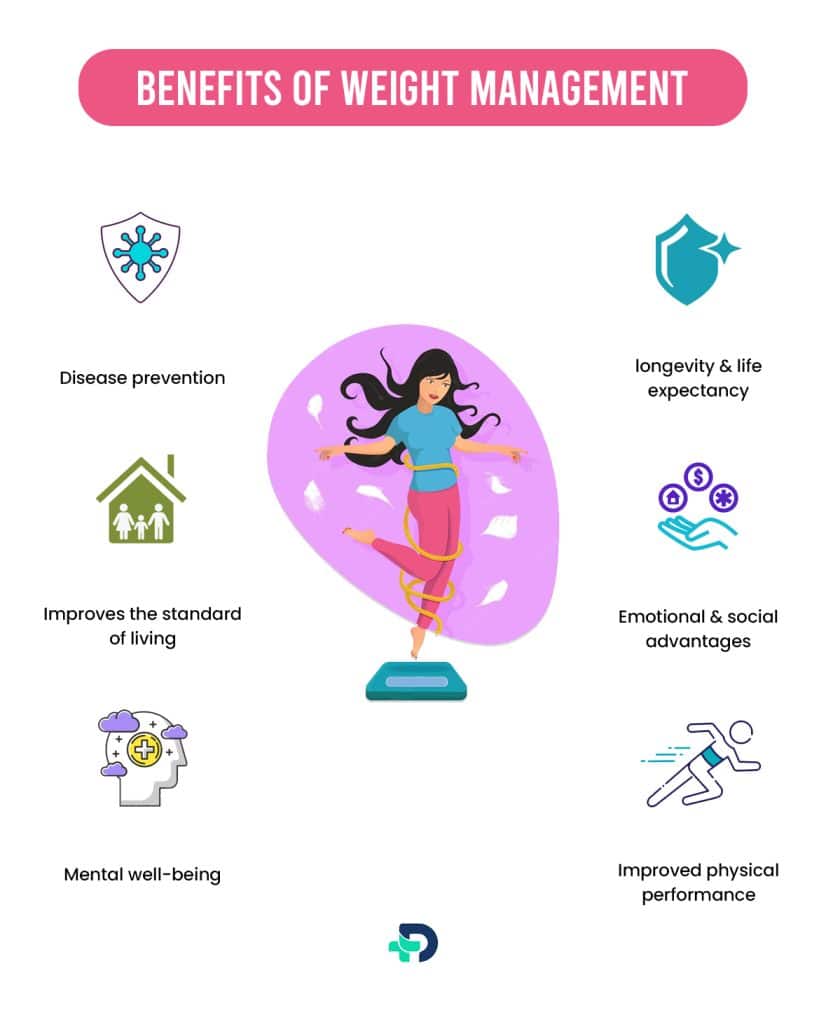A Comprehensive Guide to Successful Weight Management

- Weight Management
- 22 Aug 2023
Overview
Overview
In our fast-paced modern world, weight management has become a ubiquitous concern affecting people of all ages and backgrounds. Pursuing a healthier lifestyle, improved self-esteem, and increased vitality has led countless people on a transformative journey toward achieving and maintaining an optimal body weight.
In this article, we explore weight management, delving into the intricacies of understanding our bodies, the significance of a balanced diet, the importance of regular exercise, and the role of mental well-being in fostering sustainable change.

Benefits

Benefits of Weight management
- Health and disease prevention
- Improved quality of life
- Promotes Mental well being
- Enhanced physical functioning
- Social and emotional benefits
- Positive impact on the healthcare system
- Role model for others
It is essential for general health and well-being. It involves more than just achieving the physical appearance we want; it consists of keeping a healthy balance between the energy we use and the energy we use up. The various elements are as follows:
Disease prevention
- Keeping a healthy weight is linked to a lower chance of developing several chronic diseases, including diabetes, heart disease, hypertension, cancers, and metabolic disorders.
- A risk factor for primary medical conditions, excess body weight can strain the cardiovascular system, cause insulin resistance, and contribute to inflammation.
Improves the standard of living
- Keeping a healthy weight off can improve the general quality of life. Increased energy levels, increased mobility, improved sleep quality, and a decreased probability of experiencing joint pain and other physical discomfort are all possible outcomes.
Mental well-being
- In addition to physical health, weight management also considers mental and emotional health. A more upbeat approach might result from having a favorable body image and feeling accomplished after achieving weight-related goals.
Improved physical performance
- It supports enhanced functional capabilities and physical performance. People in a healthy weight range frequently find engaging in everyday tasks, leisure activities, and exercises simpler, allowing them to live an active lifestyle.
Longevity and life expectancy
- It is linked to longer lifespans and a lower chance of early death. Effective rate management can improve a person’s chances of living a longer, healthier life.
Emotional and social advantages
- It can enhance partnerships and social interactions. A more rewarding social connection might result from social confidence, boosted by feeling good about one’s appearance.
Preventing stigmas associated with obesity
- In many countries, prejudice, and stigma still exist, which results in discrimination and a bad attitude toward those who are overweight or obese.
- Initiatives to manage one’s weight can help foster a more inclusive society by lowering the likelihood of encountering discrimination connected to one’s weight.
Positive impact on healthcare systems
- Lowering the prevalence of weight-related medical disorders can significantly lessen the strain on healthcare systems. This intervention may result in a reduction in the cost of healthcare and a more effective distribution of available resources.
Set an example for others.
- Successful weight management can motivate others to embark on their weight loss journeys. Setting a good example and promoting healthy behaviors can influence friends, family, and the larger community.5Benefits| Researched based study from Nlm.nih.gov ,6Benefits| Researched based study from Nlm.nih.gov
Factors
Factors affecting Weight management
A complex interplay of several elements impacts it, ranging from individual behaviors and biology to environmental and social influences. Here are several crucial factors influencing:
Role of diet in weight management
- Weight is directly impacted by the calories consumed by food and beverages. A diet rich in processed foods with plenty of calories and sugary drinks can cause weight gain, but a balanced diet rich in nutrient-dense foods can help you maintain or lose weight.
Physical exercise and activity
- Regular exercise and physical activity enhance metabolic health, burn calories, and increase lean muscle mass. Sedentary lifestyle choices and inactivity can hinder the efforts.
Genetics and Metabolism
- Genetics can impact how our bodies process and store energy, and this differs from person to person. Individuals may have a higher predisposition to gain or lose weight based on their genetic composition.
Hormonal imbalances
- Hormones like ghrelin, leptin, and insulin regulate hunger and fat storage. Both hunger levels and weight management may be affected.
Old age and aging
- As people get older, their metabolisms tend to slow down, making managing their weight harder. Additionally, during menopause, lifestyle modifications and hormonal changes may impact body composition.
Emotional and psychological influences
- Stress, depression, emotional eating, binge eating, or utilizing food as a reward system all impact weight.
Sleep habits
- Poor sleep hygiene or insufficient sleep can disturb hormone levels, which can affect appetite hormones and cause weight gain or make it more challenging to lose weight.
Environment and social, and economic factors
- The availability of opportunities for physical activity, the prominence of food deserts, and access to affordable, nourishing food can all impact how well people control their weight in various regions.
Cultural and social factors
- Social expectations, cultural customs, and outside influences can influence how people eat and how active they are, impacting their weight.
Prescription drugs and health issues
- Weight gain can be an adverse effect of some drugs, including corticosteroids and antidepressants. Affecting factors include underlying medical disorders, including hypothyroidism and polycystic ovarian syndrome (PCOS).4Factors| Researched based study from Nlm.nih.gov
Strategies
Weight management Strategies
When juggling work and personal life responsibilities, achieving and maintaining weight control objectives can be challenging.
Here are some ideas to consider incorporating into a busy lifestyle:
Make physical activity a priority
- Similar to how you would schedule any other crucial appointment, schedule frequent workout sessions. You can go up and downstairs during lunch breaks instead of utilizing a lift or doing some fast homework.
Make wholesome meals
- Plan and prepare healthy meals in advance to prevent relying on fast food or unhealthy snacks during busy workdays.
- Making healthier decisions and avoiding temptation can be easier by packing wholesome snacks and meals.
Stay hydrated
- Try to stay hydrated all day by keeping a water bottle at your desk. First can be misinterpreted as hunger, which causes unnecessary snacking.
Reduce idle time
- If your profession requires extended periods of sitting, consider including mobility breaks. To break up sedentary time, get up and stretch, take short breaks, or perform desk exercises.
Set reasonable goals
- Realize that perfection is unachievable and that it’s acceptable to indulge occasionally. In your efforts to manage your weight, strive for progress rather than perfection.
Making healthy choices in social situations
Maintaining healthy habits during social gatherings and activities involving food and beverages can be challenging. Here are some suggestions for making better decisions:
- Eat a nutritious, filling supper before heading to a social function if you know that delicious food will be available. This can assist you in avoiding binge eating while at the event.
- Consider your serving sizes and enjoy every morsel. To prevent overeating, pay attention to your hunger and fullness indicators.
- Choose healthier options like salads, grilled proteins, and vegetable-based meals when possible. Reduce your consumption of fried, high-calorie, and sugary foods.
- Watch your alcohol intake as it can increase empty calories and lower inhibitions, resulting in overeating and consuming less alcohol, and substituting water or other non-alcoholic beverages instead.
- To enjoy the social side while avoiding a diet, participate in non-eating-related activities like dancing, playing games, or taking a stroll.
Long-term consistency
- Set realistic goals-Set attainable incremental goals as opposed to aiming for quick, radical changes. Maintaining consistency is simpler when your goals are within reach.
- Track progress-Keep track of your dietary intake, exercise regimen, and weight fluctuations. Monitoring your progress regularly might help you maintain accountability and spot trends or potential improvement areas.
- Find a fun workout-Pick physical activities you enjoy to increase your likelihood of sustaining them over time. It could be something you want, such as dancing, hiking, swimming, or anything else.
- Establish healthy habits-Establish a schedule that includes regular exercise, mealtimes, and enough sleep. It is simpler to keep after developing good behaviors.1Strategies| Researched based study from Nlm.nih.gov ,2Strategies| Researched based study from Nlm.nih.gov ,3Strategies| Researched based study from Nlm.nih.gov
Any feedback on this article?
 This Articles content was accurate
This Articles content was accurate Very Informative Article
Very Informative Article I have a question or a comment
I have a question or a comment
 This article contains inaccurate content
This article contains inaccurate content This article was not helpful
This article was not helpful I have a question or a comment
I have a question or a comment
We appreciate your helpful feedback!
Checkout our social pages
References
-
National Library of Medicine
Weight-Loss and Maintenance Strategies | Strategies
-
National Library of Medicine
Maintenance of lost weight and long-term management of obesity | Strategies
-
National Library of Medicine
Optimal Diet Strategies for Weight Loss and Weight Loss Maintenance | Strategies
-
National Library of Medicine
Factors That Influence Body Weight | Factors
-
National Library of Medicine
Weight loss maintenance: A review on dietary related strategies | Benefits
-
National Library of Medicine
Weight Loss and Improvement in Comorbidity: Differences at 5%, 10%, 15%, and Over | Benefits






































